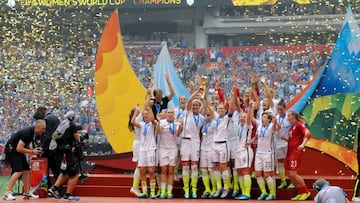US womens soccer players accuse federation of wage bias
Five members of the reigning Women's World Cup champion United States team have said they have filed a complaint against the US Soccer Federation alleging wage discrimination.

Five members of the reigning Women's World Cup champion United States team said Thursday they have filed a complaint against the US Soccer Federation alleging wage discrimination, insisting they should be paid the same as their male counterparts.
Barely four months before the American women are set to try and win a fourth consecutive Olympic gold medal at Rio de Janeiro, players are taking a major stand.
'I think that we've proven our worth over the years. Just coming off of a World Cup win, the pay disparity between the men and women is just too large. And we want to continue to fight,' World Cup Most Valuable Player Carli Lloyd said in an interview on NBC's Today show.
Lloyd, Megan Rapinoe, Rebecca Sauerbrunn, Hope Solo and Alex Morgan filed the complaint with the Equal Employment Opportunity Commission, which will investigate, issue findings and seek relief if warranted.
Historic moment. Proud of the strength of this team. #fighting #equalplayequalpay pic.twitter.com/JnAbyL8bm8
— Carli Lloyd (@CarliLloyd) March 31, 2016
'Five players signed the complaint, but the decision to file was whole-heartedly supported by the entire team,' Sauerbrunn tweeted.
The women's team won last year's World Cup in Canada, defeating Japan 5-2 in the championship game at Vancouver, while the US men's team lost in the round of 16 at the 2014 World Cup in Brazil.
The US women earned just $2 million in prize money, which the federation distributed to the women and the organization, while the losing men's team picked up $9 million.
'The numbers speak for themselves,' said Solo, a national team goalkeeper for 15 years. 'We are the best in the world, have three World Cup championships, four Olympic championships and the US men's national team get paid more to just show up than we get paid to win major championships.'
Germany's World Cup champion men's team was paid $35 million in prize money.
'We believe now the time is right because we believe it's a responsibility for women's sports, specifically women's soccer, to really do whatever it takes for equal pay and equal rights and to be treated with respect,' Solo said in the interview with the Today show.
Morgan, in an Instagram posting, said that beyond money, the women wanted greater respect, citing the quality of playing fields as an issue. A scheduled match last December in Hawaii against Trinidad and Tobago was called off due to poor field conditions.
'This is not only about equal pay -- we get paid less than half of our male counterparts -- but also equal treatment,' Morgan wrote. 'We deserve to play in top-notch, grass-only facilities like the US Men's National Team, not dangerous turf fields. We want to have decent travel accommodations.'
Five players signed the complaint, but the decision to file was whole-heartedly supported by the entire team. #equalplayequalpay #thegals
— Becky Sauerbrunn (@beckysauerbrunn) March 31, 2016
'We have dedicated our lives to this sport and our country and we love soccer and our fans. We think it's time for employers to truly address the inequality and do not only what is fair, but what is right.
'We decided to do this for all of the little girls across the country and around the world who deserve to have a voice, and if we don't leverage the voice we have, we are letting them down.'
In a statement to several media outlets, US Soccer said it was 'disappointed' by the move.
'While we have not seen this complaint and can't comment on the specifics of it, we are disappointed about this action,' the federation said. 'We have been a world leader in women's soccer and are proud of the commitment we have made to building the women's game in the United States over the past 30 years.'
The players union is in a legal dispute with US Soccer over their collective bargaining agreement, claiming the deal can be terminated at any time while the federation says the contract remains in force to the end of the year, including the Olympics.
'It has become clear that the federation has no intention of providing us equal pay for equal work,' Rapinoe said.
Related stories
'We had to take our fight for equity and equality to another battlefield,' added Sauerbrunn.
[Note: "soccer" was used in the article title to help American readers find the story]